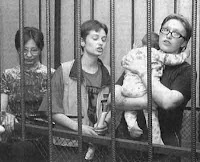On 11 October 2011 the ECHR delivered judgments in the cases of three Russian females, Ms. Nevskaya, Ms. Raks and Ms. Romanova, all of whom had been convicted of possession of explosives and terrorism. The Court ordered Russia to pay compensation to the applicants for violation of their rights guaranteed by the Convention.
The applicants were arrested in 2000 on suspicion of their involvement in explosions in 1998 and 1999: the explosion that destroyed the monument to Tsar Nicolas II in Podolsk, Moscow Region, and explosions in Moscow that damaged the façade of the Federal Security Service (FSB). In May 2003 the Moscow City Court convicted the applicants of possession of explosives and terrorism. Each of the applicants was sentenced to several years of imprisonment. [The facts of the case are described in more detail in the Court’s judgments in the cases of Nevskaya, Raks and Romanova]
All three applied to the ECHR and claimed, inter alia,[1] that Russia violated their right to a fair trial since the court proceedings against them had not been conducted in public. The Court sustained this claim in all three cases, since the Russian Government failed to convincingly show that the national security concerns and justice interests justified the exclusion of the public from the trial in the domestic court. The Court ordered Russia to pay 4,800 euros to both Nevskaya and Raks, and 20,000 euros to Romanova (since in her case Russia also violated Article 5 of the Convention (her detention did not meet the requirements of lawfulness)).
The ECHR’s reasoning:
According to the case file, the domestic court ordered to exclude the public from the criminal proceedings due to: (a) the need to ensure the security of the trial participants, (b) the nature of the charges of the applicants, and (c) the “secret” status of the case file. The ECHR disagreed with such reasoning based on the following grounds:
(a) Safety of the trial participants: The ECHR noted that the domestic court failed to explain why it was concerned about the safety of the certain persons, and why these safety concerns “outweighed the importance of ensuring the public nature of the trial.”
(b) Gravity of the charges: According to the Court, the gravity of the charges by itself cannot evidence existence of a danger the defendants may present to other parties to a trial, and therefore cannot justify closure of the entire trial to the public. The presence of such danger and necessity to hold the trial in camera can be confirmed only by assessment of the gravity of the charges together with other relevant factors. The ECHR found that the domestic court failed to make such assessment and to give reasons why it considered “the risk to the safety of the ‘participants’ to be decisive.”
(c) “Secret” information in the case-file: The ECHR stated that “the mere presence of such information in a case file” cannot automatically imply “a need to close a trial to the public, without balancing openness with national security concerns.” Thus, the domestic court failed to take “any measures to counterbalance the detrimental effect that the decision to hold the trial in camera must have had on public confidence in the proper administration of justice for the sake of protecting the State’s interest in keeping its secrets.” In the ECHR’s view, instead of closing the entire trial to the public the domestic court could have ordered a single or a number of non-public sessions to deal with “secret” documents, which it failed to do.
[1] The applicants also presented other complaints under Articles 3, 5, 6, 8-11, 13 and 18 of the Convention. However, the Court either found their complaints inadmissible or found no violation, except in the case of Romanova v. Russia, where the Court also found a violation of article 5 of the Convention.

No comments:
Post a Comment